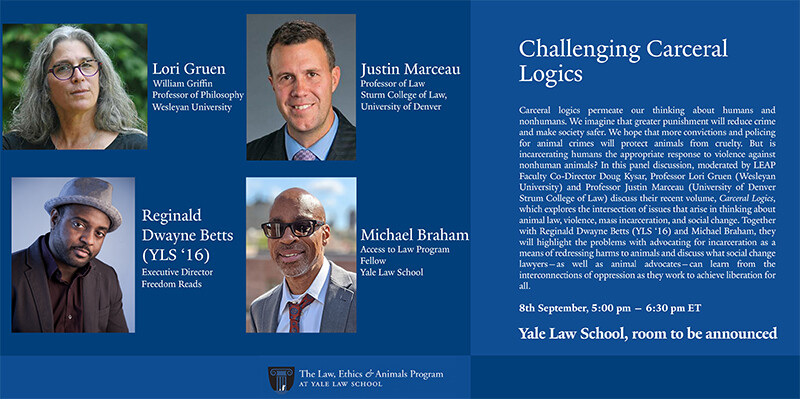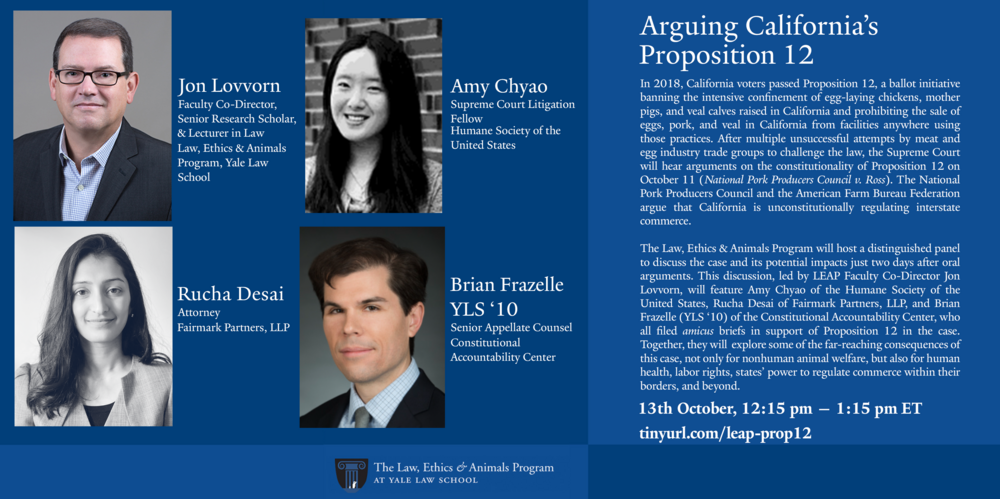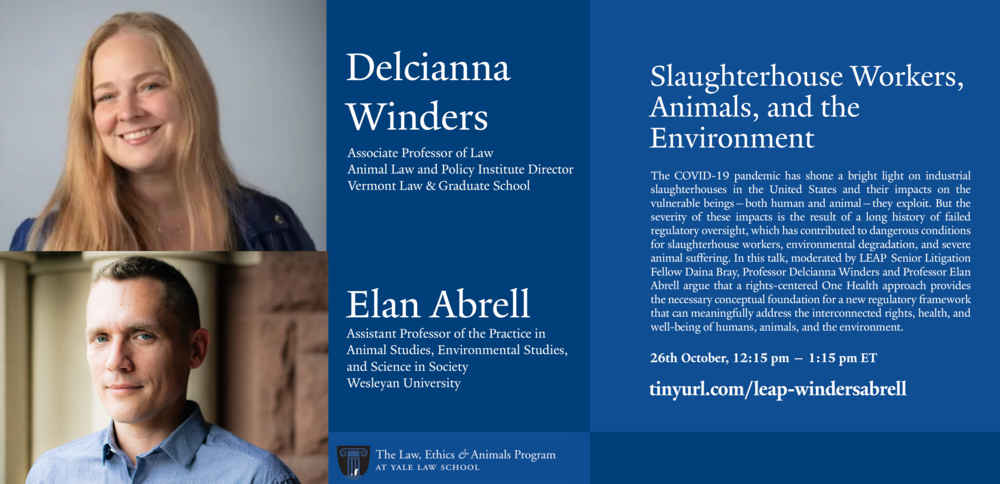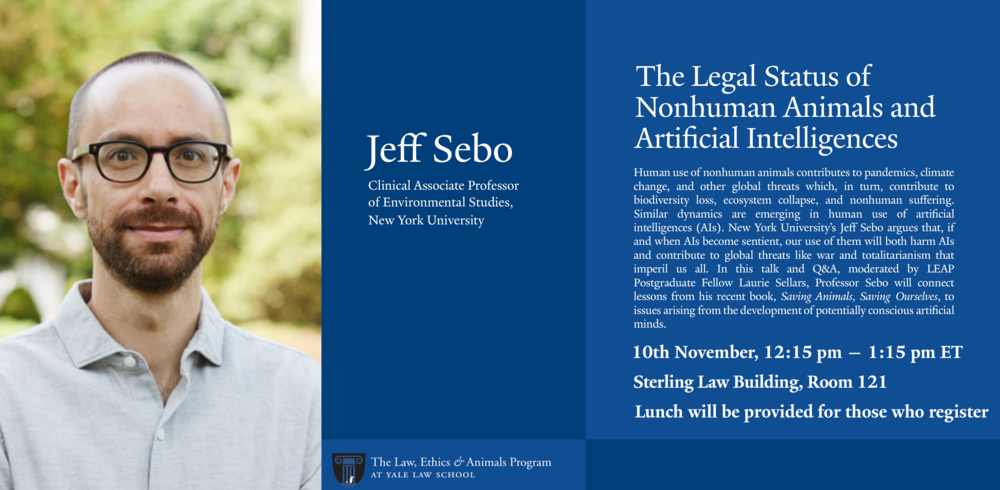LEAP Announces Fall 2022 Speaker Series

The Law, Ethics & Animals Program4 (LEAP) at Yale Law School has announced this fall’s speaker series. The series begins on Thursday, Sept. 8 with a remarkable panel of guests interrogating carceral logics and the appropriateness of incarcerating humans who commit violence against animals, featuring Wesleyan University’s Lori Gruen, University of Denver’s Justin Marceau, and Yale Law School’s Reginald Dwayne Betts ’16 and Michael Braham. LEAP’s other events this fall will explore the legal statuses of nonhuman animals and artificial intelligences, the upcoming Supreme Court case on the constitutionality of California’s Proposition 12, and the need for a new U.S. regulatory framework that recognizes the connection between humans, nonhumans, and the environment. Read more about each event and register below.
Challenging Carceral Logics with Lori Gruen, Justin Marceau, Reginald Dwayne Betts ’16, and Michael Braham
Thursday, Sept. 8, 5:00–6:30 p.m. ET
Baker Hall Room 116
Register here: https://forms.gle/ymkAABWp1JLsT4qNA5

A complete PDF of Carceral Logics11 is available for free.
Lori Gruen12 is the William Griffin Professor of Philosophy and Professor of Feminist, Gender, and Sexuality Studies and Science in Society at Wesleyan University. She coordinates Wesleyan Animal Studies and is the author and editor of 15 books, including Ethics and Animals, Ecofeminism, Entangled Empathy, and the just released Animal Crisis.
Justin Marceau7 is a Professor of Law at the University of Denver’s Sturm College of Law, the Brooks Institute Faculty Research Scholar of Animal Law and Policy, the Faculty director of the Animal Law Program, and an affiliated faculty member with the Institute for Human Animal Connections at the Graduate School of Social Work. He is the author of more than 40 law review articles and essays, two textbooks, and Beyond Cages: Animal Law and Criminal Punishment.
Reginald Dwayne Betts9 ’16 is a poet, lawyer, and Ph.D. in Law candidate at Yale. His work promotes the rights and humanity of people who are or have been incarcerated and is informed by his experience with incarceration after being tried as an adult for a carjacking at the age of 16. A 2021 MacArthur Fellow, he is the Executive Director of Freedom Reads13, a not-for-profit organization that is radically transforming the access to literature in prisons through the installation of Freedom Libraries in prisons across this country.
Michael Braham10 is a fellow with the Access to Law Program at Yale Law School and paralegal. A formerly incarcerated activist who fights for criminal justice reform in Connecticut, he works with Stop Solitary CT14, an organization that aims to end the use of solitary confinement statewide and replace isolation with humane, safe, and effective alternatives. While in prison, he started an organization aimed at promoting higher education within disadvantaged communities. Since his release he is expanding the scope of this organization to include a full-service community center which will provide a safe haven for at risk youth. He has been working with Justin Marceau and Lori Gruen as a member of the Alternatives to Cruelty Response Working Group.
This event is co-sponsored by the Arthur Liman Center for Public Interest Law, the Justice Collaboratory, the Yale Animal Law Society, Yale Environmental Humanities, the Yale Environmental Law Association, and the Yale Sustainable Food Program.
Arguing California’s Proposition 12 with Jon Lovvorn, Amy Chyao, Rucha A. Desai, and Brian Frazelle (YLS '10)
Thursday, Oct. 13, 12:15–1:15 p.m.
Register here for the webinar link: tinyurl.com/leap-prop1215

The Law, Ethics & Animals Program will host a distinguished panel to discuss the case and its potential impacts just two days after oral arguments. This discussion, led by LEAP Faculty Co-Director Jon Lovvorn17, will feature Amy Chyao of the Humane Society of the United States, Rucha A. Desai18 of Fairmark Partners, LLP, and Brian Frazelle19 (YLS ‘10) of the Constitutional Accountability Center, who all filed amicus briefs in support of Proposition 12 in the case. Together, they will explore some of the far-reaching consequences of this case, not only for nonhuman animal welfare, but also for human health, labor rights, states’ power to regulate commerce within their borders, and beyond.
Jon Lovvorn20 is Faculty Co-Director of the Law, Ethics & Animals Program at Yale Law School, a Senior Research Scholar, and Lecturer in Law. He also serves as Chief Counsel for Animal Protection Litigation for the Humane Society of the United States, and as a board member and/or legal advisor to other animal and environmental protection organizations.
Amy Chyao is the Supreme Court Litigation Fellow with the Humane Society of the United States. She oversaw the development of an amicus brief discussing the public health and food safety issues related to Prop 12. Prior to working with HSUS, she was an associate attorney with Earthjustice. She received her JD from Harvard Law School.
Rucha A. Desai18 is an attorney with Fairmark Partners, LLP, where she specializes in antitrust litigation, and focuses on sustainability, factory farming, and greenwashing issues. She represents amici small and independent farming businesses, state farmers unions, and farm advocacy organizations that are in support of Proposition 12. The amicus brief argues that Proposition 12 will promote diversity of production, and expand, rather than constrict, market opportunities for many pork producers. She received her JD from NYU School of Law in 2016.
Brian Frazelle19 (YLS ‘10) is a Senior Appellate Counsel at the Constitutional Accountability Center (CAC), which submitted an amici curiae brief on behalf of law professors support of Proposition 12. Prior to joining CAC, Brian was an attorney at the Privacy and Civil Liberties Oversight Board and held a fellowship at Public Citizen Litigation Group.
This event is co-sponsored by the Yale Animal Law Society, the Yale Environmental Law Association, and the Yale Sustainable Food Program.
Slaughterhouse Workers, Animals, and the Environment with Delcianna Winders & Elan Abrell
Wednesday, Oct. 26, 12:15–1:15 p.m.
Register here for the webinar link: tinyurl.com/leap-windersabrell21

Delcianna Winders23 is an associate professor of law and the Director of the Animal Law and Policy Institute at Vermont Law and Graduate School. Her scholarship focuses on the intersection of animal law and administrative law.
Elan Abrell24 is an assistant professor of the practice in Animal Studies, Environmental Studies, and Science in Society at Wesleyan University. He is the author of Saving Animals: Practices of Care and Rescue in the U.S. Animal Sanctuary Movement25 (University of Minnesota Press).
This event is co-sponsored by the Yale Animal Law Society, Yale Environmental Humanities, the Yale Environmental Law Association, and the Yale Sustainable Food Program.
The Legal Status of Nonhuman Animals and Artificial Intelligences with Jeff Sebo
Thursday, Nov. 10, 12:15–1:15 p.m.
Sterling Law Building, Room 121
Register here: https://forms.gle/EAo1gVgHJDFPotbbA26
Boxed lunches will be provided for those who register.

Professor Jeff Sebo27 is Clinical Associate Professor of Environmental Studies, Affiliated Professor of Bioethics, Medical Ethics, Philosophy, and Law, Director of the Animal Studies M.A. Program, and Director of the Mind, Ethics, and Policy Program at New York University. He is also an executive committee member at the NYU Center for Environmental and Animal Protection, an advisory board member at the Animals in Context series at NYU Press, a board member at Minding Animals International, a mentor at Sentient Media, and a senior research affiliate at the Legal Priorities Project.
This event is co-sponsored by the Yale Animal Law Society, Yale Environmental Humanities, the Yale Environmental Law Association, and the Yale Sustainable Food Program.


